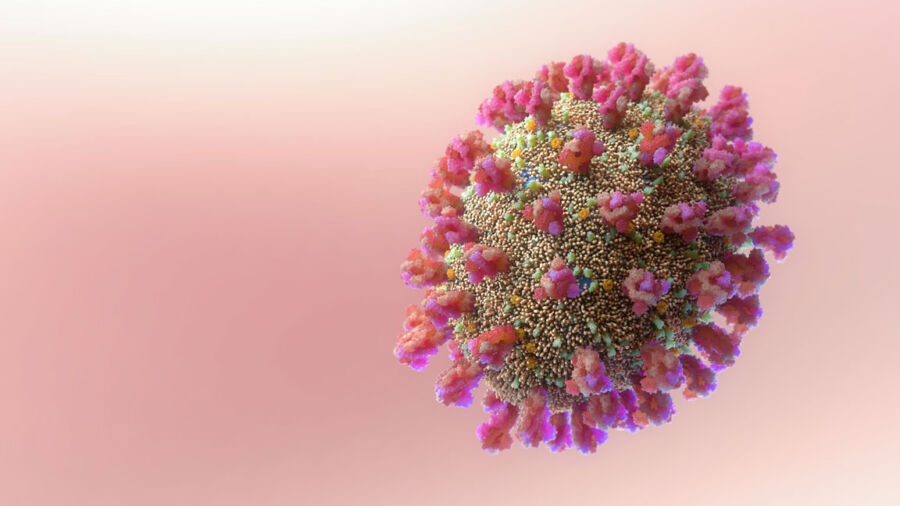COVID-19 Is Back!

Photo: National Institute of Allergy and Infectious Diseases. (CC BY-ND 4.0)
US Facing Biggest COVID Wave Since Omicron
Thought you were done with COVID-19? Think again. The United States is currently in the throes of another wave of COVID, the largest of the pandemic other than Omicron, and public health officials are bracing for greater transmission after Americans have returned to school and work following the holidays. Case counts, hospitalizations, and deaths are all ticking upward though public health officials believe that this wave will be less lethal than what the country experienced last year.
The new COVID variant, JN-1, which is now the most prevalent variant in the US , is said to be milder than previous variants but also evolves rapidly and is more adept at evading immune systems and hence appears to be more infectious.
The Centers for Disease Control (CDC) reports that few Americans are staying up-to-date on their coronavirus vaccines to train their immune systems to keep up with the evolving virus and this has exacerbated the current wave. According to CDC estimates, just 19 percent of Americans have received the latest version of the vaccine which they claim offers better protection against the JN.1 variant than the previous formula.
While case numbers appear to be increasing, the CDC reports that hospitalizations and fatalities from COVID are down compared to this time last year. Nonetheless, COVID remains one of the leading causes of death in the US, as well as the top driver of respiratory virus hospitalizations.
The Boston Globe reported on Thursday (1/4) 4,790 new confirmed coronavirus cases and 44 deaths in Massachusetts in the week from December 24-December 30. “The state also reported that 5.7 percent of all total hospitalizations during that timeframe in Massachusetts were related to COVID-19, meaning about 825 patients were hospitalized with COVID-19, and that the seven-day percent positivity was 14.83 percent.” Look here and here for detailed repoting on COVID and RSV data from Massachusetts.
In response to the uptick in cases, some health facilities have reinstated mask mandates. At Mass General Brigham in Boston masks are now required for staff and strongly encouraged for patients and visitors.
With public testing for COVID essentially eliminated, public health officials are relying on waste water monitoring to track the progress of the disease. National wastewater data indicate that the JN-1 wave is the second biggest of the pandemic in the US after Omicron. Yahoo News reports that In several countries in Europe, wastewater readngs reached unprecedented levels, exceeding those of Omicron.
Wastewater monitoring in Amherst shows a slight uptick for the month of December though any new wave will not likely be apparent until after students return later in January. The Amherst Health Department reports on its web site that it still has free COVID-19 testing kits available for the public. The site also offers guidance on testing, exposure, and isolation.
Vaccine Information
Public health officials have appealed to the public to get up-to-date on vaccines for COVID-19, RSV and the flu, as a proven means of protecting themselves for the winter’s”triple threat”. At the moment the Amherst Health Department is no longer holding vaccine clinics. Weekly clinics are still available in Northampton. Schedule appointments here.
This report was compiled from reporting by the Boston Globe, The Centers for Disease Control, The New York Times, The Washington Post, Yahoo News, and Yale Medicine.
Read More: (see here for advice on negotiating paywalls)
This Year’s COVID Wave May Just Be Starting. Here Are Four Ways to Protect Yourself. (Boston Globe)
National COVID Data Tracker (Centers for Disease Control)
COVID Has Resurged But Scientists See a Diminished Threat (New York Times)
When You Have COVID, Here’s How To Know That You Are No Longer Contagious. (Washington Post)
Another COVID Wave Hits the US as JN-1 Becomes the Dominant Variant (Washington Post)
Opinion: The U.S. is Facing the Biggest COVID Wave Since Omicron. Why Are We Still Playing Makebelieve? (Yahoo News)
Three Things to Know About JN-1, The New Coronavirus Strain (Yale Medicine)
